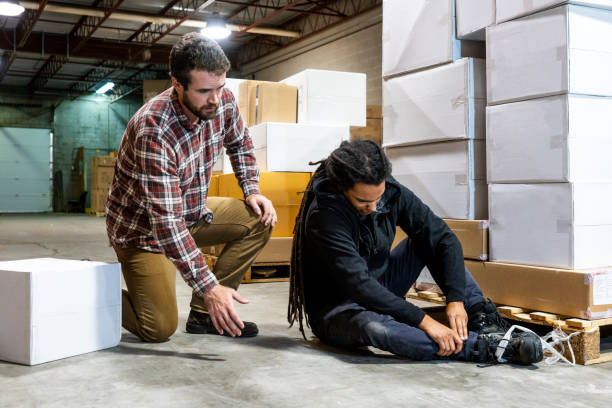(ThyBlackMan.com) Every year, millions of individuals face the harsh reality of personal injuries. Whether it’s a car accident, a slip and fall, or a workplace mishap, these incidents can drastically alter lives. For instance, according to the Centers for Disease Control and Prevention (CDC), unintentional injuries are among the leading causes of death for people aged 1-44. Beyond the physical toll, personal injuries often lead to emotional and financial challenges that can leave victims feeling powerless.
However, many individuals transform their traumatic experiences into powerful advocacy, not only for themselves but for their communities as well. By sharing their stories and pushing for change, they empower themselves and inspire others. This blog explores how personal injury experiences can transition into advocacy, offering insights into navigating the legal landscape, finding support, and ultimately creating a ripple effect of empowerment.
Understanding Personal Injury Law
Personal injury law encompasses a wide range of legal issues that arise when someone suffers harm due to another party’s negligence. This area of law aims to provide relief to victims by holding wrongdoers accountable. Based on Emerson Straw, understanding the legal framework can empower individuals to seek justice and compensation for their injuries; whether they stem from vehicle collisions, medical malpractice, or unsafe conditions in public spaces.
Common types of personal injury cases include auto accidents, workplace injuries, and slip-and-fall incidents. Each type presents unique challenges and requires different legal approaches. For many, the process can feel daunting; however, knowing your rights and the legal options available can significantly impact the outcome of a case. When individuals understand their legal standing, they become better equipped to navigate the complexities of personal injury claims.

The Emotional and Physical Impact of Personal Injuries
The aftermath of a personal injury can lead to profound emotional and physical repercussions. Victims often experience pain, limitations in daily activities, and the stress of medical bills and legal proceedings. For example, a car accident victim may struggle with chronic pain while also grappling with anxiety about their future. These challenges can be overwhelming, making recovery feel like an uphill battle.
Mental health plays a crucial role in the recovery process. The emotional toll of personal injuries can lead to conditions such as depression and post-traumatic stress disorder (PTSD). It’s vital for individuals to recognize the importance of addressing their mental health, as emotional wounds can linger long after physical injuries heal. Seeking therapy, joining support groups, or talking with loved ones can help individuals process their experiences and foster resilience during this challenging time.
The Path to Advocacy
Recognizing the need for advocacy is often a pivotal moment for personal injury victims. Many individuals find that their experiences motivate them to fight for better safety standards, legal reforms, and support for other victims. This desire for change can stem from frustration with the system, a personal sense of justice, or the wish to prevent others from enduring similar pain.
Becoming an advocate can take many forms. Victims can start by sharing their stories on social media, participating in community forums, or joining organizations that focus on personal injury awareness and reform. Each step taken not only aids the individual in their healing process but also raises awareness about the broader issues surrounding personal injury and safety. Engaging with others who have shared experiences can create a strong sense of community, turning pain into purpose.
Resources for Support and Education
Navigating personal injury claims can be challenging, but numerous resources are available to support victims. Legal aid organizations and bar associations often provide information on finding trustworthy attorneys who specialize in personal injury law. These resources can guide individuals through the complexities of filing claims, ensuring that their rights are protected.
In addition to legal resources, community support networks play an essential role in empowering personal injury victims. Support groups, both in-person and online, offer a space for individuals to share experiences and advice. By connecting with others who understand their struggles, victims can gain strength and encouragement as they advocate for themselves and others. Educational workshops and seminars on personal injury law can further equip individuals with the knowledge needed to navigate their journeys effectively.
Success Stories of Empowerment
Stories of individuals who have turned their personal injury experiences into advocacy serve as powerful examples of resilience. For instance, a woman who suffered a severe injury in a car accident used her experience to launch a campaign focused on road safety. By sharing her story, she raised awareness about the importance of seatbelt use and safe driving practices, ultimately influencing local legislation.
Another inspiring case involves a community organization founded by a group of personal injury survivors. They focus on providing resources and support for those navigating the aftermath of accidents. Through their efforts, they have created a network that not only aids victims in finding legal help but also fosters a community of empowerment and support. These success stories illustrate the potential for individuals to enact positive change through advocacy, creating a ripple effect that uplifts others facing similar challenges.
Conclusion
Transforming personal injury experiences into advocacy is a powerful journey that can empower individuals and strengthen communities. By understanding personal injury law, addressing emotional and physical impacts, and actively engaging in advocacy efforts, victims can reclaim their narratives. The path from accident to empowerment is not only possible but necessary for fostering change.
As we encourage individuals to advocate for themselves, we must also highlight the importance of community support and education. Everyone has a role to play in creating a safer, more informed society. Whether through sharing stories, seeking legal guidance, or connecting with support networks, each action contributes to a culture of empowerment. Let us all strive to transform our experiences into advocacy, paving the way for a brighter future for ourselves and others.
Staff Writer; Ronald Brown

















Leave a Reply